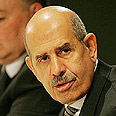
Report: Obama's secret Iran talks prepare ground for deal
Iranians report to IAEA in July that they're out of fuel for their research reactor. Obama administration sees this as opportunity to assess Iran's nuclear aspirations, asks for Russian, French assistance. Time Magazine reports on how draft proposal was reached on for Iran's uranium enrichment that keeps everyone satisfied
WASHINGTON- Time Magazine reported Friday that US President Barack Obama was personally involved in four months of secret talks between with the Iranians under Russian and International Atomic Energy Agency mediation.
A government official revealed that Obama got into the thick of things in a bid to assess Iran's nuclear intentions. It was also a test of the young president's determination to put the brakes on Iran's nuclear aspirations through incentives on one hand and through the threat of sanctions on the other.
In July, the Iranians notified the IAEA that they had run out of fuel to run Tehran's research reactor built under the shah in 1967 with American technology. The Iranians asked to purchase highly-enriched uranium to create isotopes for the treatment of cancer, taking x-rays, and insecticides. The IAEA subsequently reported this to the Americans, who viewed the Iranian request as an opportunity to assess Tehran's nuclear ambitions.
Out of concern based on US and Israeli intelligence estimates that the Iranians had amassed enough low-enriched uranium (LEU) to convert into weapons grade material for one nuclear bomb should nuclear inspectors be ousted from the country, the Americans suggested that the Iranians send uranium from their existing LEU stockpile to Russia and France where it could be further enriched and converted into fuel rods that would be difficult to weaponize.
Obama's top aide on nonproliferation, Gary Samore, presented the US proposition to Russia before Obama's Moscow visit in July. The message was that if the Russians are prepared to enrich the uranium to the necessary level, then the French – who were also secretly brought into the deal – could transform it into specialized uranium plates for creating isotopes and send them back to Iran. The Iranians do not have the capability to convert the plates back into weapons grade uranium.
Russians enthusiastic
"The Russians immediately said, 'Great idea,'" said a senior US official to the Times. In subsequent weeks, high-level talks took place between Iran, the IAEA, Russia, France, and the US in order to reach an understanding. In the middle of September, Obama summoned IAEA Chief Mohamed ElBaradei to tell him the Americans were ready for a deal. ElBaradei contacted the Iranian represented to the IAEA, who then passed on the message to Tehran and received authorization to start dealing.
The Americans sought to ensure that Iran would not convince the Russians to supply the materials for the reactor from any other source than Iran's uranium stockpile.
When Obama met with Russian President Dmitri Medvedev on the sidelines of the UN General Assembly a month ago, he put pressure on the Russian leader to supply the necessary fuel. Medvedev agreed. Obama then telephoned ElBaradei to confirm the details of the deal that were then announced on October 1 at the six-power talks with the Iranians in Geneva.
At those talks, US negotiator, William Burns, had a one-on-one conversation with his Iranian counterpart, Saeed Jalili, to confirm the amount of uranium involved in the deal. The deal was agreed upon on October 19.
The US administration was not particularly optimistic about the talks after years of failed talks. Senior administration officials were prepared for Iranian attempts to buy time even after a deal was struck.
If the deal goes through ultimately, the Americans will see this as an accomplishment because it will ensure that most of Iran's uranium store will be transferred to France and Russia, thus blocking its usage for nuclear weapons. Iran, or its part, will receive a stamp of approval for its enrichment program that has been done illegally in violation of three separate Security Council resolutions.










